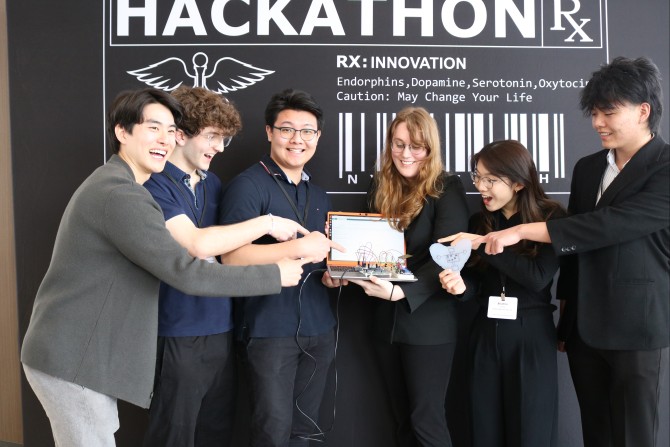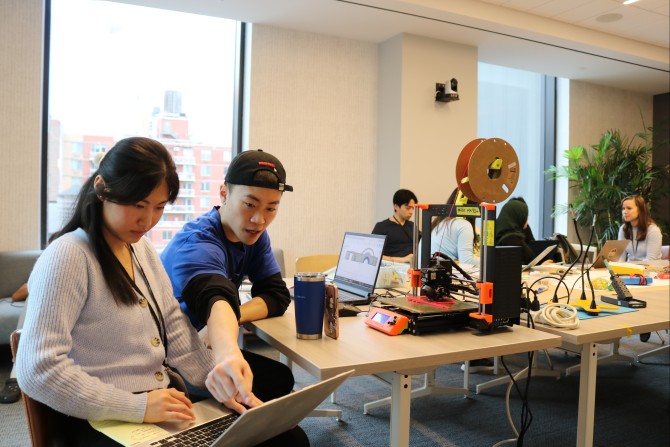News directly from Cornell's colleges and centers
Students from 29 campuses join forces for health hackathon
By Kathy Hovis
Students from all three of Cornell’s campuses – and 26 other universities – gathered in New York City over a packed weekend to brainstorm and develop solutions to health care challenges.
The Health Hackathon, sponsored by Entrepreneurship at Cornell and the Weill Cornell Medicine Clinical and Translational Science Center, took place March 8-10 and included students with backgrounds in medicine, business, computer science, economics, engineering and other disciplines. It also featured a maker space hosted by Cornell Tech, outfitted with 3D printers and other materials for prototyping.
Teams addressed the weekend’s patient safety challenges related to medication, patient care, procedures/surgery, infection and diagnostic errors by creating physical products and digital solutions.
“There’s so much hope and brainpower here,” said My Linh Nguyen-Novotny, director of clinical research education at the Clinical and Translational Science Center. “We love that Weill Cornell and Cornell encompasses all of these different schools and skill sets and what a perfect venue for these students to showcase what they can do and imagine where they might be in the future.”
This is the ninth year for the health hackathon, and Nguyen-Novotny said at least one Weill Medical staff member, who participated in a past hackathon, took that idea and started a company with her device, which helps people who have lost their voice retrain their vocal system. Ami Stuart, director of hackathons for Entrepreneurship at Cornell, said there are at least a dozen companies that have spun from these hackathons during the past 10 years, which have focused on a wide range of industries.
The top prize at this year’s Health Hackathon of $3,000 for most impactful patient care went to the Current Care team, who developed a patch bed-ridden patients could wear that issues electrical stimulation to areas prone to pressure ulcers, resulting in a reduced prevalence of the ulcers.
Members of that team included Johnson Liu ’26 (ENG), Antranig Baghdassarian ’27 (ENG), Andrew Lee MD ‘25, Brianna Leung ’25 (ENG, University of Pennsylvania), Justin Liu ’27 (CS, Northeastern University) and Leah Lackey PhD ’28 (ENG).
“I’ve had this idea in the back of my mind for years,” Leung said. “I was really just excited to send it out into the world of the hackathon and see if anyone else was interested.”
The team explored some of the most common causes of pressure ulcers, including lack of blood flow, then devised a technology to measure blood flow and use electrical stimulation to increase it, Baghdassarian said.
“Having people on our team from different backgrounds allowed us to narrow down what each person was good at from the beginning,” Lee said. “From there, we could bounce ideas off each other, and it allowed us to look at the bigger picture.”
This was the first hackathon experience for Liu.
“I had an amazing experience. I made friends, we had fun with each other, and I learned a lot,” he said. “I don’t have much experience in business, and I learned so much from the other students.”
Throughout the weekend, more than 40 mentors helped the students during the three days they spent at the Next Jump flagship office in Chelsea.
“We were able to receive so much feedback from people in the field who told us that this was a tangible idea that could work,” Leung said.
“This has made me think that we can do it,” Baghdassarian said. “We have the ideas, and given the right resources and mentors and time, we can do something that matters.”
Other winning teams included:
Most Potential Impact, $500: IP Vision, software that uses AI to detect cases of intimate partner violence in acute care settings and provides personalized treatment and support. Team members are: Lina Chihoub ’25 (University of Pennsylvania, CS), Elizabeth Madamidola MHA ’24 (Brooks), Emily Leventhal (postdoc, Icahn School of Medicine), Keshika Gopinathan MPH ’25 (Cornell VET), Mariam Rizvi ’26 (University of Pennsylvania, CS) and Raquel Castromonte MPH ’25 (CUNY).
Most Market Ready, $1,500: Fennostics, a one-step medical test to diagnose many common female vaginal health issues. Team members are: Bhavishya Agarwal MS ’24 (ENG), Justin Xiang ’27 (ENG), Edward Kim ’27 (Dartmouth, CS), Antonia Li ’24 (CALS), Rebecca Wang ’26 (University of Pennslvania, ENG), Urmila Sehrawat (Memorial Sloan Kettering Cancer Center research scholar)
Most Innovative, $2,500: Cedar, a wearable device to detects carotid artery issues and prevent stroke. Team members are: Claire Zhang ’26 (University of Pennsylvania, ENG), Duong Nguyen MPH ’24 (Columbia University), Ethan Tse PhD ’28 (Weill Cornell), Phuong Anh Dinh PhD ’28 (Columbia University), Reem Ulay ’24 (CUNY, ENG)
Best use of AI, $2,500: Team Rocket, a copilot for home health nurses to counter adverse medical effects and provide medical reconciliation and automation. Team members are An Tran ’27 (Tufts University), Dany Alkurdi MD ’27 (Icahn School of Medicine), Ferdinand Gross MBA ’24, Khanh Do ’26 (Denison University, CS), Sally Zhao MS ’24 (Columbia, CS), Stephanie Nguyen ’26 (Columbia, CS)
The hackathon was made possible through the sponsorship of Johnson & Johnson, as well as grants from the Patient Safety Technology Challenge, the Einhorn Center for Community Engagement and dCommunity.
Media Contact
Get Cornell news delivered right to your inbox.
Subscribe


